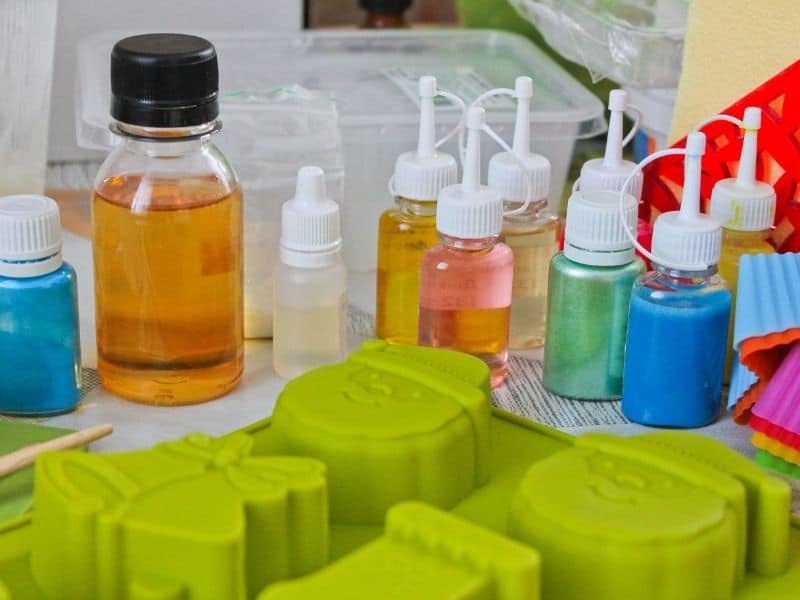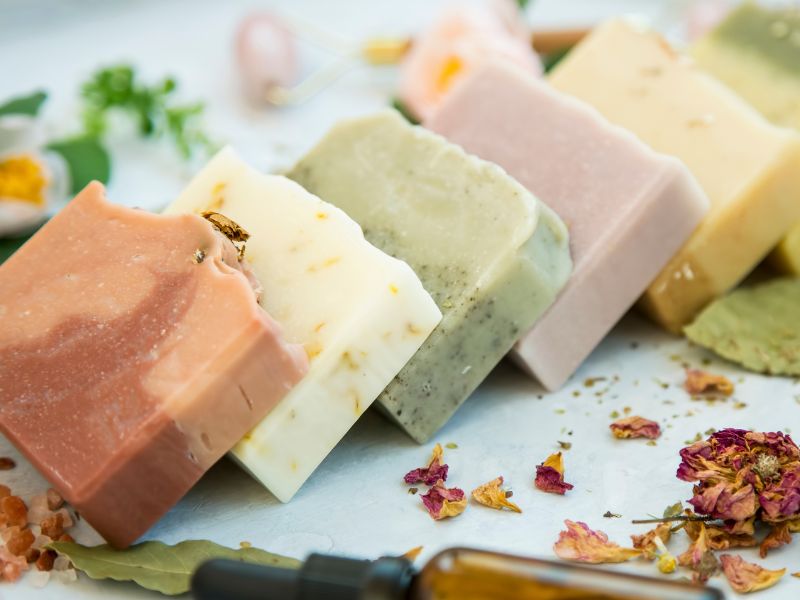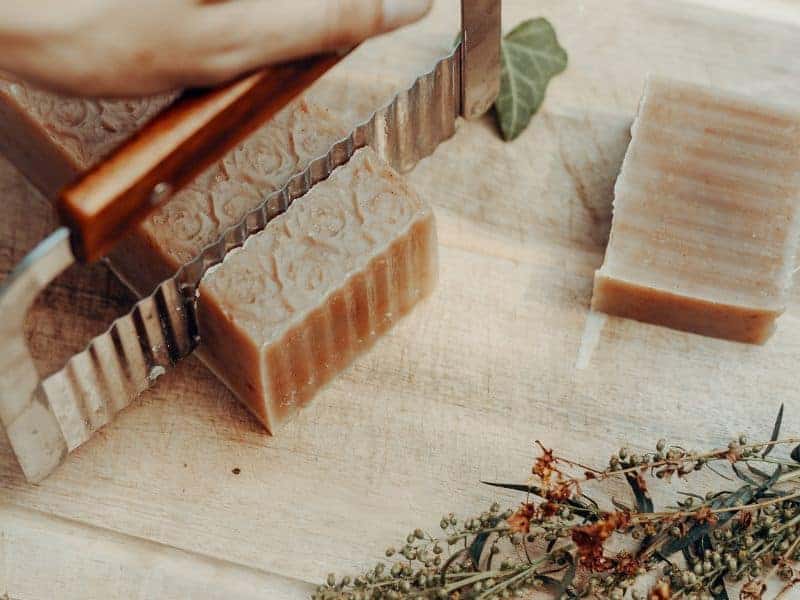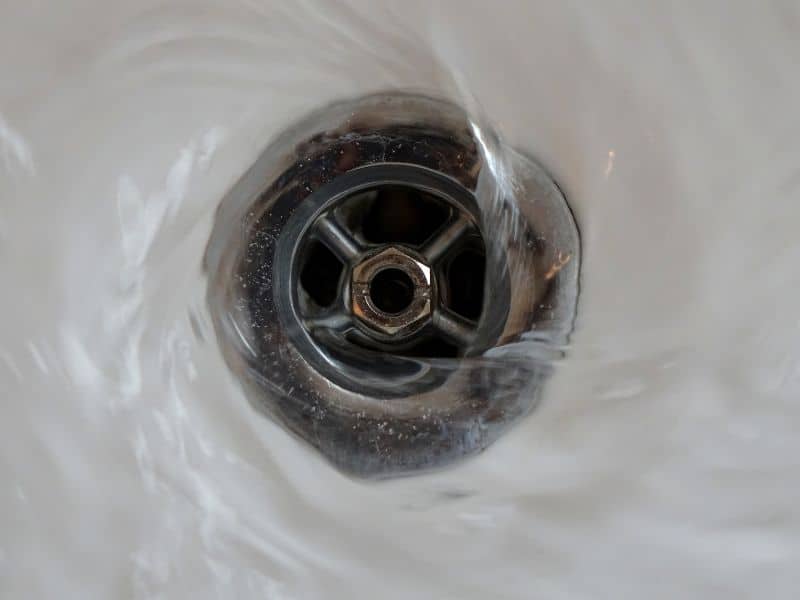Vegan soap making isn’t any more difficult than regular soap making, it is simply a process of sourcing alternative ingredients and substitutes to make soap vegan friendly.
You can choose from an array of plant-based milk and oil, add in your lye and essential oils, and decorate as needed. The process can be fun, adaptable enough to suit your budget, and easy enough for a regular supply of quality vegan soap bars.
For a soap to be considered vegan, it can’t have anything to do with any sort of animal product. This means ensuring that there are no animal by-products in the ingredients used, such as any animal fats or milk, or any animal by-products in the manufacturing process.
Everything has to be pant-based. Thankfully, this is easier than ever and you can source some great materials to make beautiful soaps that friends, family, and potential customers will love.
What Do You Need To Make Vegan Soap?
Because the process is the same as with regular soap, you need the same basic starter kit and then your vegan-friendly soap ingredients. This means sources the right pans for melting your blocks of hardened oils and heating your lye, a good thermometer and blender to perfect the mixture, and the molds.
You can use any form of reusable mold in various shapes and sizes to create large batches of vegan soap to sell. Silicone is the easiest to use and better when dealing with an audience that may dislike any unnecessary plastic.
You will also need to make sure you have suitable safety equipment like gloves and goggles for handling the lye and hot materials.
What Ingredients Go Into Vegan Soap?
With your kit set up, you need to think about what you are going to put in your soap mixture. The main thing you need to consider is a plant-based oil for the body of the soap instead of anything that uses lard, tallow, or milk.
There are lots to choose from with their own pros and cons. Then you can think about the additional essential oils and decorative elements to make your soap more saleable.
Plant-based Oils For Vegan Soap.
Plant-based oils are a must. But, you need to be careful when choosing the best option for your products. For example, palm oil has some great properties and is vegan, but there are ethical considerations about the way it is sourced.
Many vegans will deliberately not buy anything with this on the label. There are lots of interesting oils that will work well, including, jojoba, cocoa butter, argan, and even avocado. However, the three below are a good place to start.
Coconut Oil:
Coconut oil is a great choice for the best vegan soap products because it has many beneficial properties. For a start, it isn’t hard to get good-quality blocks of refined coconut oil.
Look out for the 76-degree ones as these have a better melting point, lather up nicely, and aren’t as pricey as the 92-degree version. Coconut oil is also sought after in cosmetics for its nourishing effect on the skin and its cleansing properties.
Shea Butter:
Shea Butter has been a staple in body butter ad lotions for a long time now and the great thing is that it is a plant-butter rather than an animal-butter. Therefore, you should be able to use this with ease in your recipe with few concerns.
You should end up with a good texture, scent, and lather here. Try and get an A-grade source if possible to be sure of the best quality.
Olive oil:
Olive oil is a popular choice for soap making because it is so accessible. You can pick up a bottle of pure virgin olive oil and make a decent soap out of it. The high vitamin E content is great for the skin too.
This may be cheaper and easier in some respects, but there are also downsides. You don’t get the same cleansing properties as with coconut oil, it doesn’t harden as well, and the lather is milder.
Plant-based Milk For Vegan Soap.
If you prefer the idea of using milk rather than oil for your soap, this is also possible in a plant-based formula. You don’t have to stick with goat’s milk for soap as you can also use a range of nut milk.
Coconut milk is popular for many of the same reasons as coconut oil. Some people also like to use soy milk because of its texture and lather. Be aware that some struggle with oat milk, although this would have nourishing properties when used correctly.
Other Botanical Ingredients For Vegan Soap.
The plant-based oils above are just the starting point for creating vegan soap. This gives you your oily nourishing bar with the right moisturizing and cleansing properties.
However, you aren’t going to get the ultimate sensory experience without a scent or some sort of visual appeal. This is a must when making gifts or selling these soaps to customers.
You also need some quality pure essential oils to provide that burst of scent that fills the air when lathering the soap and lingers on the hands. There are plenty of organic essential oils around that have various properties for health, beauty, and relaxation.
Lavender and tea-tree are always popular and highly beneficial, but you can experiment with other interesting combinations.
From there, you can also consider adding items like flowers, petals, seeds, or other natural elements for visual impact and texture. Natural dyes can bring in some color, but be careful not to make the soap look too artificial. This can be off-putting for the vegan crowd.
Can You Still Use Lye In Vegan Soap?
Yes. Lye is a vegan product because there is no connection to any animal source. Therefore, you can still use this sodium hydroxide solution with your chosen plant oils and essential oils to create an effective soap of high quality.
Of course, you still need to be careful with this caustic alkali solution and use all the appropriate safety gear and gloves.
Always Look For Pure, Refined, and Organic Ingredients.
Another important tip here is to consider the quality and the origin of any ingredients that you choose for your vegan soap. A good starting point is to look for any oil that has the label of pure or refined.
This means that you should get something that is 100% the intended ingredient, like 10% pure coconut oil. This means that you won’t have any questionable additives or preservatives in there. With essential oils and botanical extracts, look for 100% pure and organic sources for the same sense of quality and safety.
Remember that a lot of vegan consumers will expect full transparency about everything that is in their vegan soap. This means more than the assurance that there are no animal products.
They will want to know if there is any chance of any chemical agents, if the herbal elements are organic, and if you can promise that the soap is 100% cruelty-free.
How To Make Vegan Soap
Step 1: Gather necessary soap making equipment
These items can be found at most soap-making supply stores or online.
- Soap mold
- Liquid measuring cups
- Utensils for stirring, such as a wooden spoon or spatula
- Digital kitchen scale
- Heat resistant bowl or container
- Thermometer
- Gloves
- Safety goggles
- Pan for melting the ingredients
Setup all of your equipment and have it available before beginning to make your soap.
Step 2: Gather necessary soap making ingredients
This recipe is for a pure coconut oil vegan soap bar. This is a great base from which you can adapt the recipe to make it more interesting.
You need 454g of refined coconut oil to meltdown at the determined melting point, 66g of lye, and 150g of distilled water. You can then choose to add in your preferred essential oils and decorations.
Step 3: Begin processing ingredients
Melt the coconut oil at the determined melting point in your pan, paying attention to the temperature. At the same time, you should have your lye developing with the distilled water in another pan.
Once both mixtures are at around 100 degrees, you can mix them together. Be careful to avoid any bubbles here. Now the saponification reaction should start as you get the beginning of a soap batter. Blend the mixture for a smooth consistency and even color.
Step 4: Add fragrance oil and pour it into molds.
Now you can add in any essential oils you wish to include. This is where you get to be experimental with each batch your make and create blocks to order based on scents or specific health-giving properties.
Once it gets a bit thicker you can pour it into the mold. If desired, you can add dried flowers to the molds and pour the mixture over the top for that more interesting look.
Step 5: Cut and cure the soap for a minimum of 4 weeks
Once the soap is hard and ready to take out of the mold and cut it, you are left with a quality bar that looks beautiful.
But, it isn’t ready yet.
You need to leave the soap to cure for between 4-6 weeks so that any moisture remaining in the product can evaporate and you end up with the best vegan soap possible.
After this period is up, you can package it up as desired and get ready to sell it or gift it to someone special.
Frequently Asked Questions
Vegan soap is a term used for soap that doesn’t contain any animal-derived ingredients. This includes milk, honey, lard, or any other animal fats.
No, not all soaps are vegan. Some may contain beeswax or honey.
Yes, there are a few benefits to using vegan soap over traditional soap. First, it is often more gentle on the skin and can be less drying. It is also good for those with allergies to certain ingredients like milk or honey. Finally, vegan soaps often have a more natural scent and are made with ingredients that are considered more sustainable.
Saponification is the process of turning oils or fats into soap. During this process, a chemical reaction occurs between the lye and the oil, resulting in glycerin and soap.
The melting point of coconut oil is around 76 degrees Fahrenheit. You can adjust this temperature depending on your needs by adding more or less coconut oil to the recipe.
Conclusion
In conclusion, making your own vegan soap is a fun, easy process that can result in some high-quality bars of soap. You can get creative with the ingredients and scents you use, making each batch unique.
It’s a great way to work with essential oils and make something special for yourself or others. Be sure to allow enough time for curing, though, or you won’t be able to enjoy your hard work!
So, there you have it! The basics of how to make vegan soap. There are many ways to customize this recipe, so feel free to experiment. Thanks for reading!






